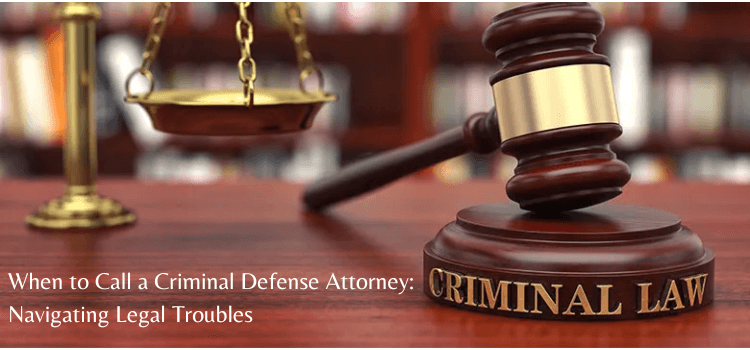Legal troubles can be likened to quicksand. The more you struggle without proper guidance, the deeper you sink. You might think it’s premature, but it’s often better to get legal help early to avoid unnecessary complications down the line. When should you make that all-important call to a criminal defense attorney? So, without further ado, delve into this complex issue step by step.

The Early Bird Gets the Worm: Pre-Arrest Consultation
Sometimes, like dark clouds gathering before a storm, one can sense legal trouble brewing on the horizon. This is where a pre-arrest consultation with a criminal defense attorney becomes invaluable. Think of it as your legal weather radar, offering early insights into what’s coming and how best to prepare for it. During such consultations, you might discover that a warrant has been issued for your arrest or that you’re the subject of an ongoing investigation. This head start can be pivotal in gathering evidence and crafting a strong defense strategy tailored to your unique situation.
First Contact: Police Interrogations and Interviews
Imagine a scenario where a detective invites you for what they frame as a “friendly chat.” This situation often signifies that you’re a person of interest in an ongoing investigation. It’s akin to stepping on a snake; while it may not bite immediately, the potential danger looms. Seeking counsel from an attorney before engaging in discussions with the police can prevent you from inadvertently making self-incriminating statements, safeguarding your rights and protecting your interests.
Knock, Knock: When Law Enforcement Comes to Your Door
Picture a moment when law enforcement officers arrive at your doorstep, either armed with a search warrant or intent on making an arrest. This juncture in your legal journey is as pivotal as a turning point in a gripping novel; your subsequent actions could define the entire storyline of your case. Your attorney can meticulously review the legality of the search or arrest, identifying any potential grounds for getting the case dismissed. This early intervention is critical in preserving your rights and ensuring that your defense strategy starts on solid ground.
Booking and Initial Appearance: More Than Just Mugshots
Following an arrest, the process involves booking and possibly an initial appearance before a judge. While it might seem procedural, akin to checking in for a flight, it carries substantial weight. This is the juncture where bail is set and charges are officially read. Having an attorney by your side ensures that your rights are protected throughout this process, like having a guide when navigating a complex maze.
Negotiating Bail: The High-Stakes Poker Game
After arrest, there is often an opportunity to post bail and secure temporary freedom. But setting bail is like a poker game with life-changing stakes. Your attorney can negotiate a lower amount or even argue for your release on personal recognizance, ensuring you don’t spend unnecessary time in jail. In Florida, there is a minimum fee of $100 per bail bond, and failure to pay this amount means the individual will not be released before trial; furthermore, bail bond amounts typically range from $1,000 to $3,000, but having a previous restraining order violation and facing arrest for a second stalking case often results in significantly higher bail amounts.
Preliminary Hearings: The First Hurdle
The preliminary hearing represents a critical juncture in the legal process where the court determines whether sufficient evidence exists to proceed with the case. Think of this stage as a qualifying round in a race; failing to clear it means you won’t advance to the finals. An experienced attorney can sometimes achieve a favorable outcome at this point, potentially leading to the dismissal of charges and sparing you from a protracted legal battle. Your attorney can present arguments and evidence to challenge the prosecution’s case, emphasizing any weaknesses in their allegations. This stage is an opportunity to assert your innocence and protect your rights.
The Plea Bargain Chessboard
If you’ve watched courtroom dramas, you know that many cases don’t go to trial; they end in plea bargains. Negotiating a plea is a complex chess game; every move counts. Your attorney will help you understand the risks and benefits, playing the board in a way that minimizes your penalties.
Trial Time: When All Else Fails
If the case proceeds to trial, it marks the grand finale of your legal journey. At this stage, your attorney’s role evolves from an advisor to an advocate, fighting for your rights and innocence like a gladiator in an arena. From selecting jurors to presenting evidence, the experience and skills of an attorney can make a substantial difference in the trial’s outcome. Your attorney can carefully craft your defense strategy, ensuring that your side of the story is effectively conveyed to the jury. They can cross-examine witnesses, challenge the prosecution’s evidence, and present compelling arguments in your favor. Your attorney’s courtroom expertise can be the deciding factor in whether you are acquitted or face conviction.
Knowing when to consult a criminal defense attorney cannot be overstated. From sensing impending legal troubles to walking through the complicated maze of the criminal justice system, professional guidance is invaluable. The sooner you bring an attorney into the picture, the better your chances of navigating the storm successfully.






Leave a Reply